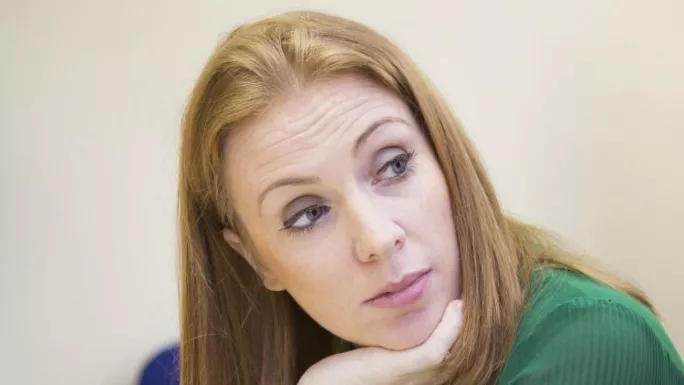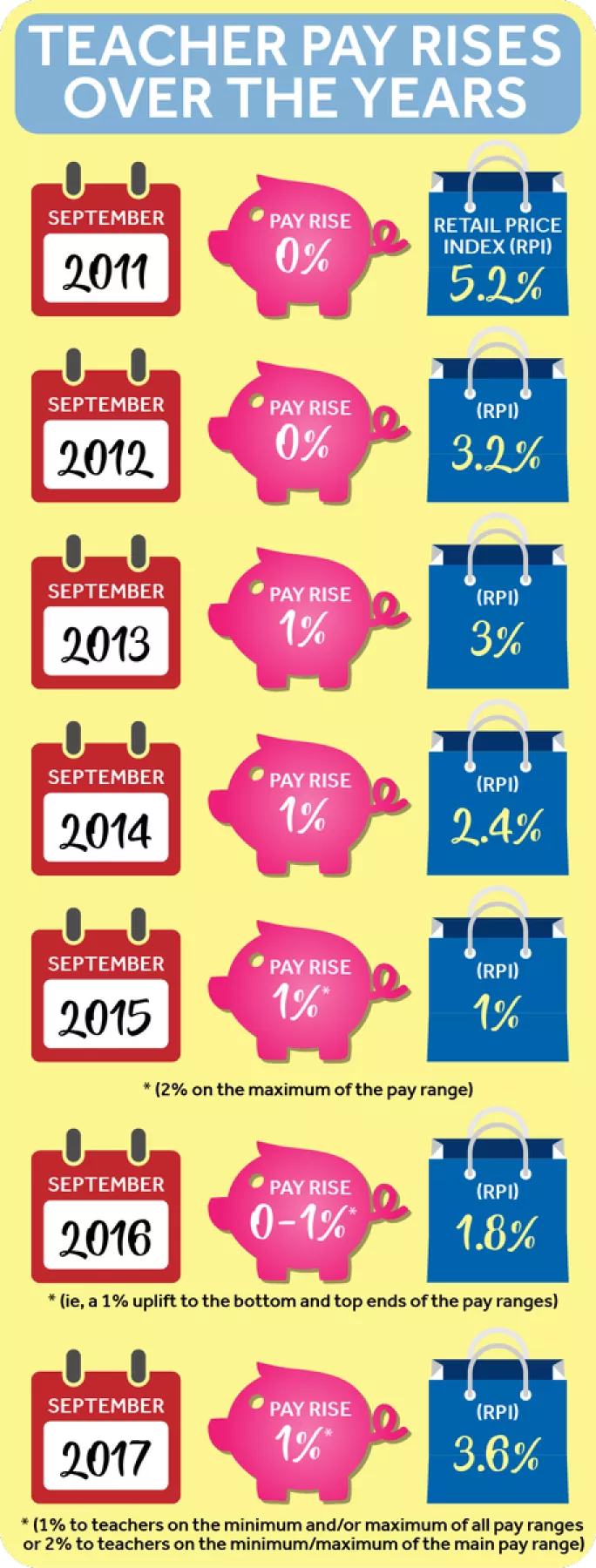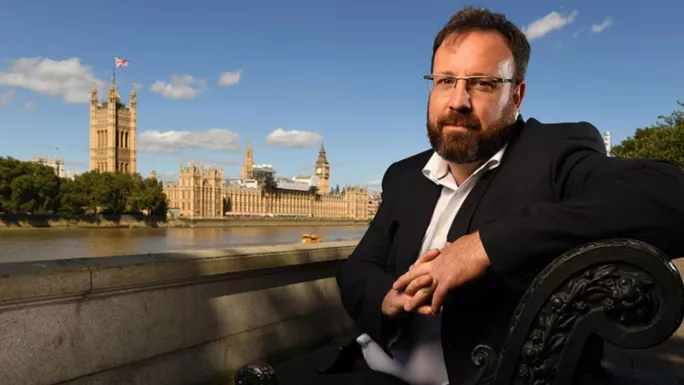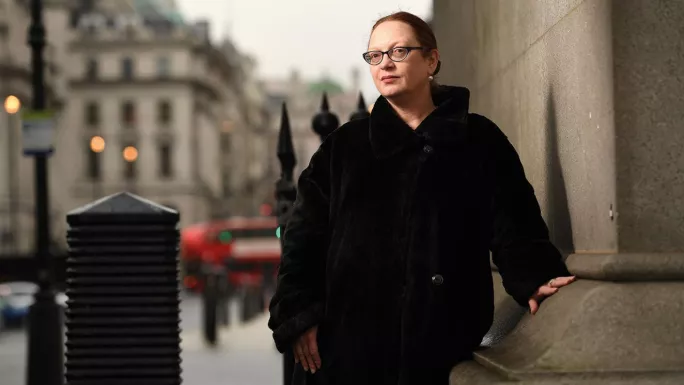- Home
- Teacher pay: LIVE
Teacher pay: LIVE

Most teachers will suffer a real-terms pay cut in September, a respected thinktank has said.
An Institute for Fiscal Studies (IFS) analysis of today’s teacher pay settlement estimates that about 60 per cent of teachers will receive pay increases below the current 2.3 per cent headline measure of inflation.
The devil is always in the detail, writes ASCL’s Geoff Barton today as he reflects on today’s news. He asks: “Isn’t it a basic job of government to provide pay awards for its public servants? It is surely short-termism of the worst kind to rely on spending cuts to public services in order to discharge that responsibility. Don’t we have a right to expect a better long-term strategy from the government, not just in respect of education, but in terms of how it manages our public finances?”
Labour’s shadow education secretary Angela Rayner MP says: “The pay review body warned that schools are struggling to recruit and retain teachers in leadership roles, and the government have chosen to give these very teachers another real terms pay cut for the eighth year in a row.
“There is still no information about what areas of funding will be cut to meet the cost of the pay rise. It is time for ministers to be honest with school leaders and others about where the money will come from.”

Union leaders have raised concerns over a partially-funded and “demoralising” pay award.
Classroom teachers on the main pay scale will get a pay rise of 3.5 per cent, it was announced today, while those on the upper ranges will get 2 per cent and leaders will receive 1.5 per cent.
While the pay increase for classroom teachers on the main pay scale has been welcomed by unions, there are mixed feelings about the details of the announcement, reports Helen Ward.
Helen Ward lists the eight key points from the School Teachers’ Review Body (STRB), report:
-
All teachers should get a 3.5 per cent pay rise.
-
Pay awards could be targeted at particular teachers in future
-
Teachers are falling further behind other graduate professions
-
The teacher recruitment and retention crisis is getting worse
-
The DfE believes “enough teachers being recruited”
-
Damian Hinds thinks ‘more work’ is needed to boost ITT applications
-
Teacher vacancy statistics have come under fire
-
The pay deal should be published earlier
A report published by the Education Policy Institute says: “Increasing teachers’ pay is a sensible step towards making the profession more attractive and overcoming the recruitment and retention difficulties it faces, but that does not come free of charge. Such investment is necessary to maintain the quality, experience and stability of the teaching workforce.”
The ASCL, the NAHT, and the NEU have released a joint response on today’s teacher pay announcement raising their concerns over the different pay rise rates, the timing of it and that it isn’t fully funded by the DfE.
Geoff Barton, general secretary of the ASCL, says: “It is deeply unfair that the pay award for leaders and for teachers on the upper pay range will be funded at a lower rate and they will regard this decision as a kick in the teeth for their hard work.
It is also regrettable that the pay award is only partially funded and that the DfE has had to find that money from down the back of the departmental sofa as this will impact on other education services.”
Paul Whiteman, general secretary of the NAHT, agrees and says: “By ignoring the STRB’s advice that all teachers and school leaders need the same pay rise, the DfE have failed to recognise and reward the critical role performed by leadership teams. This will do little to retain valued and experienced senior teachers and leaders. Our members will feel let down by the government.”
And Mary Bousted, joint-general secretary of the NEU, says: “We are concerned that the DfE will be forced by the Treasury to make unacceptable cuts to other parts of its education budget and we will monitor this carefully. We regret that the DfE has not accepted the STRB’s recommendation of 3.5 per cent for all teachers and school leaders, and we will continue to campaign for this and for improved funding for all schools, as the government moves into the comprehensive spending review.”
It’s time to get graphic about teacher pay rises over the years...

NEU’s joint-general secretary Kevin Courtney asks, why haven’t upper spine teachers been awarded the 3.5 per cent?
And Hilary Goldsmith, Vardean School’s director of finance highlights there’s just £360 a year between upper pay scale 3, and leadership 1.
Jules White on behalf of Worth Less? says that today’s announcement lacks in clarity, details and meaningful joined-up thinking.
“Amidst a long-term crisis of recruitment and retention, teachers will receive a much-needed boost to their pay: the issue is, however, that there are insufficient funds to pay for it.
Headteachers will have to raid their already devastated budgets to fund part of the increase, whilst the DfE will have to slash other parts of their support for schools in order to cover the remaining costs.”
Russell Hobby, chief executive of Teach First, said:
“Great teachers are absolutely crucial to the future of our country and they must be fairly rewarded for the impact they make each and every day on the next generation.
“We welcome the Government starting to address the gap between teacher starting pay and other professions, but this should not come at a cost to existing essential education budgets.
“For most teachers, the motivation to make a difference to young people’s lives gets them up in the mornings, but motivation alone does not pay the bills. In recent years we have seen other professions, including in the public sector, pull ahead of teaching in starting salaries. We must see this gap addressed if we are to attract the best and brightest to teach in communities where they are needed most.”

Leora Cruddas, chief executive of FASNA, says:
“It is right that teachers should receive a cost of living pay award. However, in the context of considerable financial pressures on schools and trusts, it is not reasonable to expect employers to fund this pay award within existing budgets.
We welcome the Secretary of State’s recognition of this and the decision to fund the difference between the 1% award expected under the public sector pay cap and the pay award for this financial year. This is a welcome first step.
We will work with the DfE to ensure that the pay award, which will now be embedded in school and trust budgets, is funded through the comprehensive spending review next year.”

A summary of today’s School Teachers’ Review Body (STRB) report, suggests that in the future, pay rises for teachers could vary by the subject and phase they teach.
It says these will need to be considered “to make sure that the national pay framework provides the optimal structure for recruiting and retaining teachers and supporting their career progression in different school phases and subject specialisms, and in all areas of the country.
“This next phase may require targeted pay awards, and further uniform uplifts to pay and allowance ranges may not be appropriate in the future.”
Teachers may have been promised a pay rise of 1.5-3.5 per cent, but school unions say that the pay restraint schools have suffered from is equal to a pay cut of 16 per cent in real terms since 2010, reports Hélène Mulholland.
BREAKING: Teachers will receive a pay rise of up to 3.5 per cent from September. Those on the main pay scale will get 3.5 per cent, while those on the upper ranges will get 2 per cent and leaders will receive 1.5 per cent.
Jonathan Simons, Varkey Foundation’s director of policy, and former head of education at the Policy Exchange, looks forward to the upcoming announcement and suggests that while it could be great for recruitment, it may be terrible for retention.
Teachers and leaders are venting their frustration at the timing of the announcement on Twitter. Heads may have to revise budgets over the summer to deliver a pay increase if it isn’t fully funded by the government.
Tes’ Ed Dorrell wrote last week that the long wait portrays a disregard for the teaching profession and that it is this same attitude that allows the DfE to insist that schools are better funded than ever before and that the recruitment and retention crisis isn’t really a crisis.
“Yes, healthcare is important. Yes, Brexit is a political distraction on a monumental scale. But surely schools, teachers and the millions of children they educate should not be a treated as a political afterthought,” he wrote.
The delay in the pay announcement has already led to ‘massive worry’ and sleepless nights for the teachers already feeling the consequences of the long wait for news, reports Hélène Mulholland.
“It’s become a silly game in which a failure by the DfE to announce is causing school leaders and financial staff to have to generate documents that are - fictitious would be a strong word, but certainly speculative,” said the head of Southend High School for Boys, Robin Bevan. “And they’re all doing it en masse, simply because those that at the centre, the secretary of state in particular, simply failed to do what he should have done a couple of months ago.”
Here’s everything you need to know and the teacher pay delay. Why have teachers been waiting so long for their latest pay deal? How much can they expect and who will pay for it?
It’s the last day of term and the education community is still waiting for news on whether or not a pay rise will be granted for September. We will be keeping you up-to-date on all the latest news in this live blog and on Twitter.
Keep reading for just £1 per month
You've reached your limit of free articles this month. Subscribe for £1 per month for three months and get:
- Unlimited access to all Tes magazine content
- Exclusive subscriber-only stories
- Award-winning email newsletters



